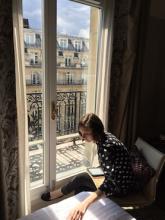Months of research, sifting through the documentary traces of the past. Not just learning the history of a different region, but immersing yourself in its culture. Spending the day in the archive, and only coming up for air for a coffee and quick bite of food. These are exciting rites of passage for Department of History graduate students working on their PhD theses. Our current cohort are excavating the stories of the past all over the world, in the archives of Moscow, Pakistan, Shanghai, London - as well as right here at home in North America.
One of these students is Madison Heslop, a PhD candidate and Fulbright Scholar, who works on the history of the Pacific Northwest, and has been spending her time recently in the archives in British Columbia, Canada.
Heslop’s dissertation project looks at the connected histories of early twentieth-century Seattle and Vancouver, British Columbia, as observed through the urban waterfront. She is especially interested in the people who lived and worked in waterfront districts, and on how these neighborhoods have provided a locus for constructing narratives and images of the cities and their distinctive relationships to the Pacific.
We caught up with Madison to find out what the archival research experience has been like for her:
Department of History: What kinds of archival sources are you interested in?
Madison Heslop: I have been working most with municipal collections in the City of Vancouver Archives. My other research materials here are in the University of British Columbia Special Collections and the Vancouver Maritime Museum.
D.H.: What has been your experience working in the archives?
M.H.: I feel extremely privileged to be a historian working in English-language archival collections largely from the 20th century. So many materials are typewritten and in great shape . . . which I know is not the case for many scholars. I sent a photo of one ledger to my advisor, to which he responded that it was one of the nicest, most legible records he'd ever seen! I have also been fortunate in that everything tends to be neatly organized as well. All this is to say there has been nothing remarkable about the "foreignness" of the archives for me. As for accessibility, there are always things I wish were digitized and therefore searchable, but the one wall I have run up against is the moratorium on making criminal records publicly available before 100 years have passed. A part of my project has turned out to rely heavily on Vancouver Police Department materials, but permission issues have limited the scope of that section.
D.H.: What does the daily life of a historian in the archives look like?
M.H.: I have a whole stack of document request slips tucked into various pages of my notebook that I filled out whenever something struck my interest or seemed important, and I pick them out based on what I want to focus on that day. Recently I have been cross-referencing names and addresses in reading room copies of old Vancouver directories, but I am back to document folders and microfilm now.
D.H.: What has been the most intriguing thing you have come across?
M.H.: Far and away the most intriguing thing I have pulled from the archives was the first volume in the set of Vancouver Police Department's prisoners records, which had the title ROGUES GALLERY—a term I had previously only encountered in comic books—printed on the spine. The book interested me enough that I have built an entire dissertation chapter around it and subsequent volumes in the set.

D.H.: Has you project changed at all during your period of research abroad?
M.H.: Absolutely. I know many people go into a project with a list of the exact collections and documents they want or need to see, but I started almost from the opposite point of having broad, more thematic interests guided by the idea that my dissertation chapters would develop out of what I found most interesting in the archives. This meant I had a slow start as I pulled a range of materials I wasn't always sure would be useful, but the result has been that my project has been profoundly shaped by my time in Vancouver and especially by the amount of time the Fulbright grant has allowed me to spend in reading rooms here.
